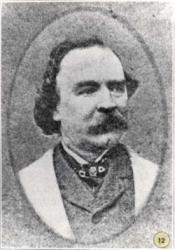Planning worship?
Check out our sister site, ZeteoSearch.org,
for 20+ additional resources related to your search.
- |
User Links
Person Results
William F. Sherwin

1826 - 1888 Person Name: W. F. Sherwin Composer of "PASS THE WORD" in The Home and School Hymnal Sherwin, William Fisk, an American Baptist, was born at Buckland, Massachusetts, March 14,1826. His educational opportunities, so far as schools were concerned, were few, but he made excellent use of his time and surroundings. At fifteen he went to Boston and studied music under Dr. Mason: In due course he became a teacher of vocal music, and held several important appointments in Massachusetts; in Hudson and Albany, New York County, and then in New York City. Taking special interest in Sunday Schools, he composed carols and hymn-tunes largely for their use, and was associated with the Rev. R. Lowry and others in preparing Bright Jewels, and other popular Sunday School hymn and tune books. A few of his melodies are known in Great Britain through I. D. Sankey's Sacred Songs and Solos, where they are given with his signature. His hymnwriting was limited. The following pieces are in common use:—
1. Grander than ocean's story (1871). The Love of God.
2. Hark, bark, the merry Christmas bells. Christmas Carol.
3. Lo, the day of God is breaking. The Spiritual Warfare.
4. Wake the song of joy and gladness. Sunday School or Temperance Anniversary.
5. Why is thy faith, 0 Child of God, so small. Safety in Jesus.
Mr. Sherwin died at Boston, Massachusetts, April 14, 1888.
-- John Julian, Dictionary of Hymnology (1907)
==================
Sherwin, W. F., p. 1055, i. Another hymn from his Bright Jewels, 1869, p. 68, is "Sound the battle cry" (Christian Courage), in the Sunday School Hymnary, 1905, and several other collections.
--John Julian, Dictionary of Hymnology, New Supplement (1907)
William F. Sherwin
John H. Maunder

1858 - 1920 Composer of "DUNBAR" in The New Canadian Hymnal John Henry Maunder United Kingdom 1858-1920. Born at Chelsea, England,,the son of a carpenter, he attended the Royal Academy of Music. He began his career as a theatre composer, but later specialized in sacred music for the Anglican Church. He became an author and composer, as well as a musician. He was organist at St. Matthew’s, Sydenham (1876-77); St. Paul’s, Forest hill (1878-1879); and at churches in Blackheath and Sutton. He married Ellen Fanny Fulgoux Dakin, and they had a daughter, Winifred. He provided musical accompaniment for concerts in Albert Hall, and, in 1881, conducted the Civil Service Vocal Union. He wrote about 20 church anthems, 10 cantatas, several carols, tunes for around 30 hymns, 19 songs and ballads, 12 services and canticles, two operettas, and six instrumentals. His best known cantata was “Olivet to Calvary”. He was known for his good musical style and great technical facility. His compositions were full of melodic ideas and were written for ease of interpretation. He died at West Brompton, London, England.
John Perry
John H. Maunder
Charles E. Kettle
1833 - 1895 Person Name: C. E. Kettle Composer of "[Pass the word along the line]" in The Service of Praise Charles Edward Kettle, 1833-1895
Born: 1833, Bury St. Edmunds, Suffolk, England.
Died: Circa February 1895, Steyning district, Sussex, England.
As of 1881, Kettle lived in Hove, Sussex, where he was an organist.
--www.hymntime.com/tch
Charles E. Kettle
H. O. Knowlton
Author of "Pass the Word Along the Line" in The New Canadian Hymnal Knowlton, H. 0. Duffield notes under her hymn, "I cannot tell if short or long" (Trust), in Laudes Domini, 1884, that "Miss Knowlton was a school-girl in Illinois at the time of its composition. Professor W. F. Sherwin received it from her through the good offices of one of her teachers, a mutual friend " (English Hymns, 1886, p. 238).
--John Julian, Dictionary of Hymnology, Appendix, Part II (1907)
H. O. Knowlton


 My Starred Hymns
My Starred Hymns

